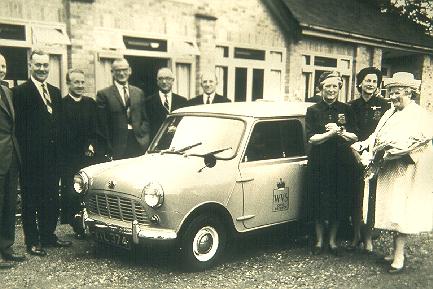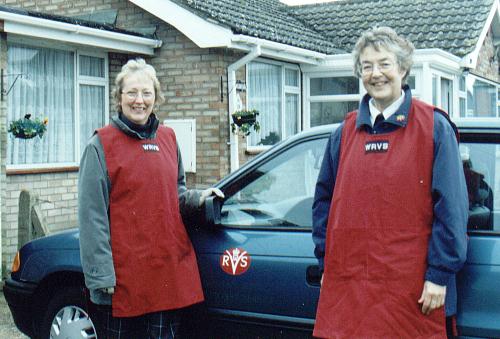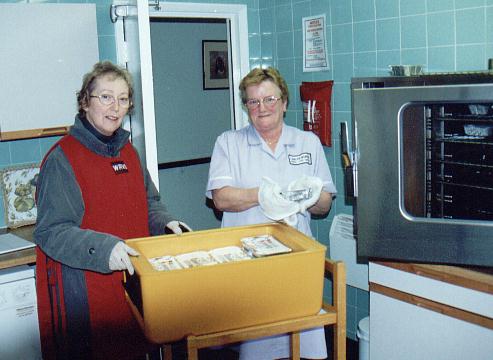|
The Women's Royal Voluntary Service
ALSO KNOWN AS THE WRVS
The Women's
Royal Voluntary Service, better known by its original acronym WVS, has been active in Bourne since its inception in the year before the Second World War.
It was formed in 1938 as the Women's Voluntary Service and its members now work for local authorities or on national government schemes and perform welfare services including Meals on Wheels which provides for the delivery of regular meals for the elderly and infirm
who are unable to shop and cook for themselves.
The Bourne branch was formed in August 1938 by Mrs Kate Cooke and one of their main functions during the war years was to find homes for evacuees sent to Bourne to escape the bombing in their home towns, particularly Hull, and to provide canteens for troops passing through. The branch lapsed during the 1950s but was eventually revived by Mrs Cooke's
daughter Joy as organiser and a dozen supporters and their social work has continued with its quiet and efficient service ever since although there have been times when their activities have achieved public attention.
One such occasion was in the autumn of 1972 when Britain gave refuge to a large number of Asians who had been thrown out of Uganda by
President General Idi Amin. Over 2,000 of the refugees were airlifted into this country and Bourne became a staging post for hundreds of them on their way to camps elsewhere in Britain. The first party of 130 arrived in Bourne at 2.30 a m on a Thursday morning in October aboard three coaches, men, women and children, all weary and distressed and most of them were penniless, having
been robbed by General Amin's soldiers and officials before leaving. Members of the Bourne WVS were on hand to help them under the leadership of two past stalwarts, the late Mrs Kathleen Wherry, the team leader, and the deputy organiser,
the late Mrs Marjorie Wilson. By 3 p m that afternoon, the party had been given rest and refreshment in the Corn Exchange before continuing their journey but just as the WVS members were clearing up, a message came through that more were on their way. Over that long weekend, members cared for 800 refugees and others arrived over the next six weeks and were given similar comfort.
|
The first
van was presented in 1963 at a ceremony outside the Darby and Joan
Hall in South Street attended by the fund raisers and council
representatives. They are (left to right): Ted Wilson, F Mason
(council clerk), the Rev J C Husk (United Reformed Church), Reg
Sones, Jack Moody (Bourne Fire Brigade) and Ernie Robinson
(ambulance officer). The ladies on the right are Mrs V Wherry, the
local WVS organiser, Mrs Wilson from the Lincoln office and
Mrs F E Tipler, chairman of Bourne Urban District Council.
|
 |
Meals on Wheels is now one of the main functions of the WRVS and their first van was provided in 1962 thanks to four local men, Teddy Wilson, Reg Sones, Jack Moody and
Ernie Robinson who raised the necessary £397 to pay for it. Five times a week,
Mondays to Fridays, members deliver hot, nourishing meals to between 30 and 40 people who are housebound for various reasons. The food is prepared and cooked at Digby
Court and Worth Court, and 16 volunteers, both men and women, are required
each week on a rota basis to maintain the service by driving and
delivering.
The secretary of the Bourne WRVS since 1997 is Mrs Jackie Wiggins and
the local organiser is Mrs Margaret McGregor who took over from Mrs Nancy
Wherry in January 1983 when the local office was situated in the Pyramid Club in West Street,
moving to the Butterfield Day Centre two years later. It was Mrs McGregor who presented a bouquet to Princess Alice, the Dowager Duchess of Gloucester, at a service in Lincoln Cathedral in October 1988 to celebrate the movement's golden
jubilee and she also received a long service medal in 1999.
But it is not all meals and comfort. The service runs a weekly shop on
Friday afternoons at Digby Court old people's home in Bourne and delivers
books-on-wheels to the housebound, while some members help with the shop
for prisoners at Stocken Prison near Stamford. They also have a team of
several members who are trained to work with the police in the event of
disasters such as train and plane crashes or major fires, providing meals
and snacks for the emergency services and setting up rest centres where
necessary. They were in fact called out to two big fires during 2000.
The WRVS is still very much alive and active. After being financially
aided by the Home Office since its inception, it is now a nationally
registered charity, raising its own funds, and as with all voluntary
organisations, more members, both men and women, are always needed because
their work is never ending.
 |
 |
|
The WRVS at work on
their
meals-on-wheels service in November 2001: Preparing for the day's delivery
(left) is local organiser Mrs Margaret McGregor, right, with Mrs Merrin Woodland who is also pictured (right) collecting meals at
Worth Court from Mrs Isobel Harris of the Lincolnshire Home Care
Service.
AN HONOUR FOR THE CO-ORDINATOR
One of the longest serving members of the Women's Royal
Voluntary Service was Mrs Margaret McGregor whose work with Meals
on Wheels was honoured in December 2008 when she retired as
co-ordinator after 26 years. A special coffee morning was held at
the Butterfield Centre on Thursday 4th December when she was
presented with a farewell cake and other gifts to mark her
departure. Mrs McGregor, aged 75, had helped organise the delivery
of 6,000 meals a year to frail and elderly people in and around
the town who were unable to cook for themselves. "I have
thoroughly enjoyed every moment", she said, "especially the
teamwork, because I could not have done anything without a fine
band of volunteers." Mrs McGregor became organiser in 1982 when
the service was run by the WRVS and based at the Pyramid Club in
West Street. The headquarters were moved to the Butterfield Centre
two years later but remained under the direction of the WRVS but
in 2005, after moves to end the service, it was taken over by the
Butterfield Centre to ensure that it continued and still provides
over 100 meals a week.
See also Michael McGregor
|
|
THE W R V S - A SHORT HISTORY
The original intention of the Women's Voluntary Services for Air Raid Precautions (ARP) was
to provide extra personnel for ARP work. It was formed in June 1938
by Stella, Dowager Marchioness of Reading (1894-71), at the
request of the Home Secretary, Mr Samuel Hoare, to draw women into
civil defence as the threat of war increased. These women took on all roles and in February 1939 the name was changed to Women's Voluntary Services for Civil
Defence. They worked in every imaginable job including salvage, medical support, staffing public kitchens, shelters, food drives and the organisation also included a Housewife's Section. Those with children or
other commitments or were too busy for regular duties with the WVS or Civil
Defence, worked when they had time to spare.
The Housewife's Section was formed in 1938 and early in 1942 had evolved into the National Housewife's Section of the
WVS. It was common practice for Housewife's Section members to be trained as fire guards who carried out regular night-time vigils to report fires during bombing attacks, as well as having first aid and anti-gas training. |
See also The Evacuees

Go to:
Main Index Villages
Index
|


